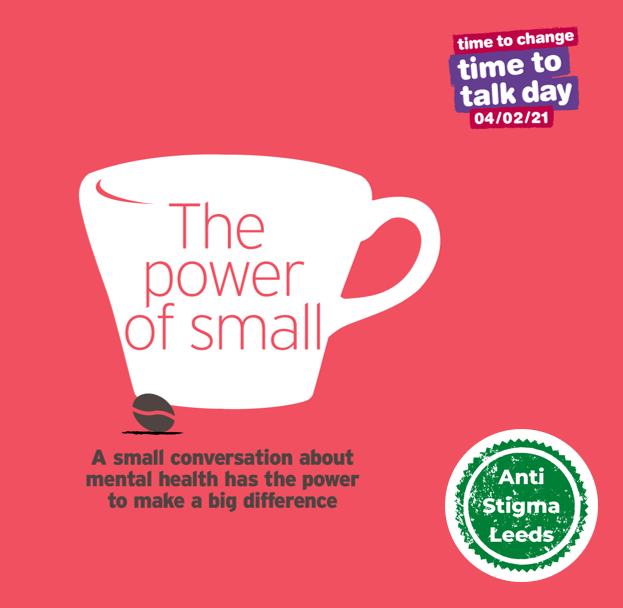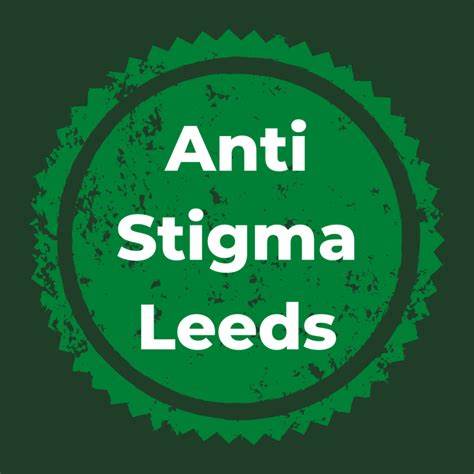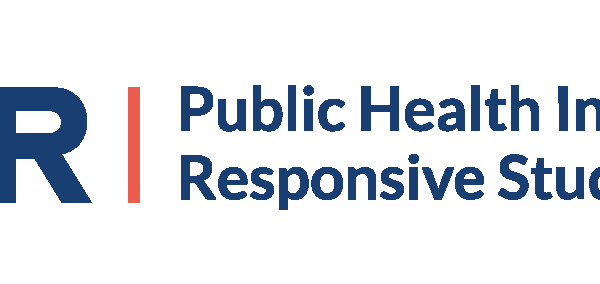
The theme for Time to Talk Day 2021 was ‘the power of small’, because a small conversation about mental health has the power to make a big difference.
At Leeds Mind, we know this to be true, especially in the context of the pandemic, where a simple conversation can mean even more to us when we are isolated or worried.
Time to Talk Day is an initiative from Time to Change, a social movement led by Mind and Rethink Mental Illness that aims to end mental health stigma and discrimination.
For Time to Talk Day 2021, we teamed up with the other organisations that form the Anti-Stigma Leeds group, led by Touchstone, to get our city talking about mental health.
Together, we held a coffee morning and a Twitter chat, while Touchstone hosted a full day of person-led events. We also distributed flyers and got people talking in our existing support groups. Here are some of the stories that were shared that show the power of small:
(All stories paraphrased and shared with the storyteller’s permission)
Arfan
“Approximately 10 years ago, I was sectioned under the Mental Health Act. This was the power of ‘big’; that is government legislation, medication etc. I felt that the ‘big’ cure was causing me more harm than good. It was the small conversations with other service users that really helped. One particular service user who was very quiet told him: “You’ll be ok one day. Don’t worry.” That has stayed with me, and was a small thing that had a big impact.”
Helen
“When taking our dog for a walk, everyone wants to stop for a (socially-distanced) chat. People seem to be looking for an opportunity to talk. We should all try to be brave and talk to people and ask them how they are.”
Alison
“I do lots of small but effective things to keep me well, including singing in the shower and watching silly things on the TV.”
Read Alison’s full story here.
Rita
“In my work role, I was given a list of people to check in on. As the months have gone by, I’ve learned the power of finding something small to start the conversation. For example, one man was a keen football fan, so I started checking match results to discuss with him. One woman became animated when talking about holidays. In other words, I found a little thing that meant something to them and referred to that thing when speaking with them. I can’t change the world but every interaction I have I can try to make a good one.”
Amber
“My neighbour put their phone number at the bottom of a card they popped through our letterbox. It was a small and friendly gesture suggesting that she wanted to talk, and made me feel able to strike up that relationship with her. It felt good that she felt I was friendly and approachable enough.”
Ush
“I started a new job in lockdown, and it was difficult to get to know new colleagues over video calls. I reached out to people to have chats and touch base. I’ve even made birthday party packs for colleagues’ birthdays during February, and am enjoying regular Zoom lunches, just for a chat. Just these little things to boost others’ morale (and my own).”
Anonymous
“I recently moved house and wasn’t comfortable where I was living. One day, out-and-about, I was having a good cry, and someone stopped to ask me if I was OK. I wasn’t ready to talk that day, but I really appreciated this person’s small act of kindness. I’d encourage people to be braver in starting conversations with others, if you feel able, as it can mean so much to someone.”
Lucy
“The power of small is that you don’t have to find a way to fix everything – all you have to do is listen, and just asking if someone is OK can do so much. People can be scared of saying the wrong thing if someone is struggling, but it’s just about talking and listening. It can also help not to use clinical labels – just normalize how someone is feeling.”
Angela
“I was chatting on messenger with a friend who was saying things that made me concerned for his wellbeing. He was a man in his mid-thirties and was struggling to open up. I felt scared to open the conversation in case I said the wrong this. But I did ask about how he was feeling, and then he started to open up. I felt so relieved that I’d asked him, afterwards. Everyone struggles and sometimes people just want an outlet.”
Erin
“About a year ago, I, unfortunately, had to leave a job due to Mental Health reasons. During a conversation with my family which included my Mum, my Auntie and my Grandma, we began to talk about mental health, in particular anxiety. I began explaining the feelings and emotions I was having on this job. During that conversation, my grandma began explaining, how when she was my age she felt nervous getting on a bus into the city centre and she would clutch her bag on the bus as a way, to deal with the nerves. She also explained how she wouldn’t sleep the night before because she felt so anxious to complete this journey. Just by starting a small conversation, about how I was feeling, it helped my family acknowledge their own mental health. But I think it is has helped us create a space for us to talk about mental health which wasn’t there before.”
Emily
“At school, I never felt able to talk about mental health, but as an adult I always try to bring it up in conversation. Instead of asking ‘how are you?’ (which can feel like a big question to answer when you don’t feel good) I ask something like: ‘how are you today?’ or ‘how’re things?’, and most people say what they’re doing. I then try to ask about how those things are making them feel. It’s OK if they don’t want to share, but it’s just about the small act of offering and ear.”
Steph
“A while ago, I spoke to a mental health Champion on the phone who had been to a developing country to do voluntary work. At first, she felt that saying ‘how are you?’ was silly and irrelevant due to the poverty people were living in, but it wasn’t something they were used to being asked and she said people really appreciated it. That taught me that everyone and anyone might appreciate that small question: how are you today?”
We want to say a huge thank you to everyone who participated in Time to Talk Day with us this year. The more conversations we have, the more myths we can bust and barriers we can break down, helping to end the isolation, shame and worthlessness that too many of us with mental health problems are made to feel. This year’s event might have had to be a little different, but right now open conversations about mental health are more important than ever.
You don’t need a day to champion better mental health for all, or help break down the stigma. Why not test the power of small? Today, simply ask someone how they are (then double check: how are you really?) You can also follow @AntiStigmaLeeds

Anti-Stigma Leeds is commissioned by Leeds City Council’s Public Health Team, and led by Touchstone. Find more info on the Touchstone website.



